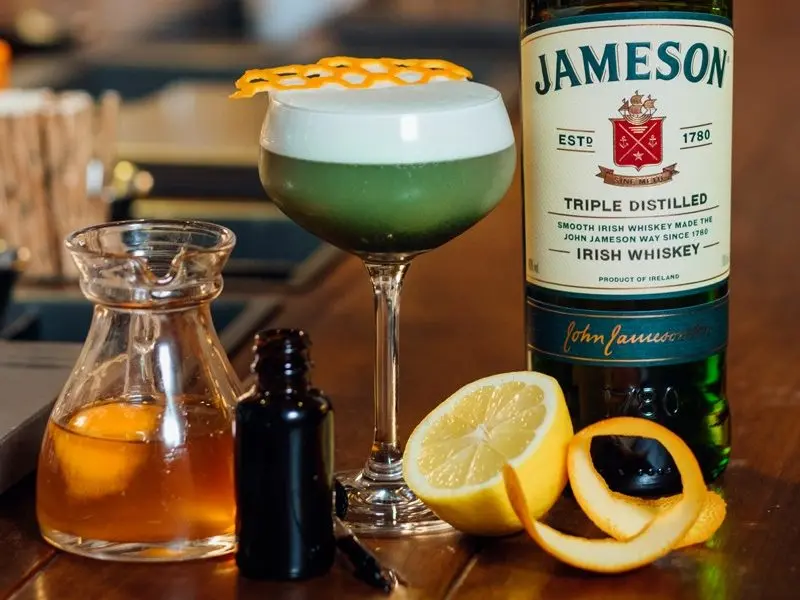
Are you curious about the differences between Irish whiskey and Scotch? These two types of whiskey are often compared, but they have distinct characteristics that set them apart. In this article, we’ll explore the unique flavors, production methods, and histories of Irish whiskey and Scotch.
If you’re a whiskey enthusiast, understanding the differences between Irish whiskey and Scotch can help you appreciate the nuances of each type of whiskey. Whether you prefer the smoothness of Irish whiskey or the complexity of Scotch, there’s something for everyone to enjoy. So, let’s dive in and explore the world of Irish whiskey and Scotch!
Table of Contents
History of Irish Whiskey and Scotch
 photo credit: www.jamesonwhiskey.com
photo credit: www.jamesonwhiskey.com
Irish Whiskey’s History
Irish whiskey has a long and storied history, with the first written record of it dating back to 1405. Monks returning from their travels in Europe brought with them the distilling expertise that would eventually lead to the creation of Irish whiskey.
By the 1700s, Irish whiskey had become one of the most popular alcoholic beverages in the world. It was known for its smoothness and unique flavor profile, which were achieved through a triple distillation process. Today, Irish whiskey is still triple distilled and is made from a mash bill of malted and unmalted barley, as well as other grains such as corn and rye.
 photo credit: www.johnniewalker.com
photo credit: www.johnniewalker.com
Scotch’s History
Scotch whisky, on the other hand, has a slightly different history. While the Scots claim to have been distilling spirits for many years prior to the first written record of it in 1494, it wasn’t until the 1700s that Scotch whisky began to gain popularity.
Scotch whisky is typically made from malted barley, although other grains such as rye and wheat can also be used. It is distilled twice, which gives it a distinct flavor profile that is different from Irish whiskey. Scotch whisky is also aged for a minimum of three years in oak barrels, which gives it its characteristic color and flavor.
Production Process
Irish Whiskey’s Production Process
Irish whiskey is made from a combination of malted and unmalted barley, as well as other grains such as wheat and rye. The grains are first ground into a coarse flour, mixed with hot water, and then left to steep for several hours. This process is called mashing, and it allows the natural enzymes in the grains to convert the starches into sugars.
After the mashing process, the liquid is transferred to large vats where yeast is added to begin the fermentation process. This is where the sugars are converted into alcohol. Unlike Scotch, Irish whiskey is usually triple-distilled, which results in a smoother and more refined taste. The triple distillation process removes impurities and produces a higher alcohol content.
The whiskey is then aged in oak barrels for a minimum of three years. During this time, the whiskey takes on the flavors and characteristics of the wood, which can include vanilla, caramel, and spice. The longer the whiskey is aged, the more complex and nuanced the flavor profile becomes.
Scotch’s Production Process
Scotch is made from malted barley, which is first soaked in water and then allowed to germinate. The germination process is stopped by drying the barley using peat fires, which gives Scotch its distinctive smoky flavor. The dried barley is then ground into a coarse flour and mixed with hot water in a process called mashing.
After mashing, the liquid is transferred to large vats, where yeast is added to begin the fermentation process. This process takes around two to three days and results in a liquid called wash, which has an alcohol content of around 8–10%.
The wash is then distilled twice in copper pot stills, which removes impurities and concentrates the alcohol. The resulting liquid is called new make spirit, which is then aged in oak barrels for a minimum of three years. The aging process is where the flavors and characteristics of the whiskey develop, which can include notes of smoke, peat, and fruit.
Taste Comparison
When it comes to taste, Irish whiskey and Scotch have their own unique characteristics. Here’s a breakdown of the differences:
Irish Whiskey
Irish whiskey is known for its smoothness and sweetness. It has a lighter body and is often described as having a fruity taste with hints of vanilla and caramel. This is because Irish whiskey is made with both malted and unmalted barley, and sometimes other grains like wheat or rye. The unmalted barley gives it a lighter flavor, while the malted barley adds sweetness.
Scotch
Scotch, on the other hand, is known for its smoky, peaty flavor. It has a heavier body and is often described as having a more complex taste with notes of smoke, peat, and even iodine. This is because Scotch is made with only malted barley, which is dried over peat fires, giving it that distinct smoky flavor.
Price Comparison
When it comes to price, both Irish whiskey and Scotch can range from affordable to extremely expensive. However, historically, Scotch has been the more expensive spirit. While high-end Irish whiskey is available for a few thousand dollars, premium Scotch labels can cost you hundreds of thousands of dollars.
If you’re on a budget, there are plenty of great options for both Irish whiskey and Scotch that won’t break the bank. For example, you can find a bottle of Jameson Irish Whiskey for around $20–30, while a bottle of Johnnie Walker Black Label Scotch can be found for a similar price.
Conclusion
Ultimately, the choice between Irish whiskey and Scotch comes down to personal preference. If you prefer a smoother and lighter taste, Irish whiskey may be the way to go. If you prefer a smokier and more robust flavor, then Scotch may be more your style. Regardless of your preference, both Irish whiskey and Scotch offer a wide range of choices for whisky enthusiasts to explore and enjoy.
Related Posts
If you’re interested in comparing different types of whiskies, there are plenty of other comparisons to explore. Here are a few related posts that you might enjoy:
- Battle of the Bourbons: Buffalo Trace vs Eagle Rare – This post compares two popular bourbons: Buffalo Trace and Eagle Rare. Learn about the differences between these two whiskies and find out which one might be right for you.
- Buffalo Trace vs Woodford Reserve: Which Bourbon Reigns Supreme? – If you’re trying to decide between Buffalo Trace and Woodford Reserve, this post can help. It provides a detailed comparison of the two bourbons, including tasting notes and production information.
- Jack Daniel’s vs Jim Beam: Which Whiskey Reigns Supreme? – Jack Daniel’s and Jim Beam are two of the most popular American whiskey brands. This post compares the two and provides information on their histories, production methods, and tasting notes.
- Jim Beam vs Evan Williams: Which Bourbon Whiskey Comes Out on Top? – Jim Beam and Evan Williams are both affordable and delicious bourbon whiskeys. This post compares the two and provides information on their flavor profiles and production methods.
- Old-Style VS Modern: was whisky “better back then”? – If you’re interested in the history of whiskey production, this post provides an interesting perspective. It explores the question of whether whiskey was “better back then” and compares old-style and modern production methods.



